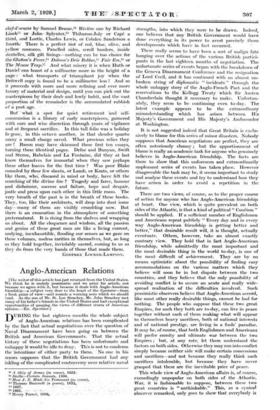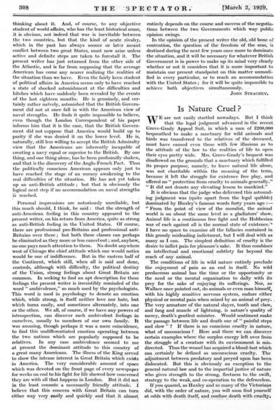Anglo-American Relations
[The writer of thiS article has just returned froth the United States. We think he is unduly pessimistic and we print his article, not because we agree with it, but because it deals with Anglo-American friendship—a -subject very dear to the heart of the Spectator—from a fresh point of view--and sounds a warning note,which we should heed. As the son of Mr. St. Loe Strachey, Mr. John Strachey met many of his father's friends in the United States and had exceptional opportunities of gauging the views of different strata of American opinion.—En. Spectator] TifURING the last eighteen months the whole subject -1-f • of Anglo-American relations has been complicated by the fact that actual negotiations over the question of Naval Disarmament have been going on between the British and American 'Governments. • That the actual history of these - negotiations has- been-unfortunate and unhappy it would be idle to deny. This is not to condemn the-intentions Of either -party to them: --No one in his senses supposes that the. British Government had any inkling of the complicated controversy over relative naval ", A Ship of Armes (in verse), 1653: • Diella--Certain Sonnets, 1596.
13 How J. S. Made his Testament (in verse). " Thomas Bancroft (a poem), 1633. " 1607.
• 1631. ": • u Henry Parrot, 1606.
strengths, into which they were to be drawn. Indeed, one believes that any -British Government would have done everything in its power to avert precisely those developments which have in fact occurred.
There really seems to have been a sort of malign fate hanging over the actions of the various British partici- pants in the last eighteen months of negotiation. The unfortunate series of events began with the breakdown of the Geneva Disarmament Conference and the resignation of Lord Cecil, and it has continued with an almost un- broken string of diplomatic " incidents " through the whole unhappy story of the Anglo-French Pact and the reservations to the Kellogg Treaty which Sir Austen Chamberlain thought it necessary to make. Unfortun- ately, they seem to be continuing even to-day. The latest example appears to be the extraordinary misunderstanding which has arisen between His Majesty's Government and His Majesty's Ambassador at Washington.
It is not suggested indeed that Great Britain is exclu- sively to blame for this series of minor disasters. Nobody supposes that American negotiators are perfect, they are often notoriously clumsy ; but the apportionment of blame is really an academic task for anyone who genuinely ,believes in Anglo-American friendship. The facts ., are there to show that this unforeseen and extraordinarily unpleasant series of events has taken place. Howeyer disagreeable the task may be, it seems important to study and analyse these events and try to understand how they have arisen in order to avoid a repetition in the future.
There are two views, of course, as to the proper course of, action for anyone who has Anglo-American friendship at heart. One view, which is quite prevalent on - both sides of the Atlantic, is that a kind of political " Coueism " should be applied. If a sufficient number of Englishmen and Americans repeat publicly " Every day and in every way Anglo-American friendship is getting better and better," that desirable result will, it is thought, actually eventuate. Others, however, take an almost exactly contrary view. They hold that in fact Anglo-American friendship, while admittedly the most important and .the most desirable thing in the -world to-day, is one of the most difficult of achievement. They are by no Means - optimistic about the possibility of finding easy accommodations on- the various matters which they believe will soon be in hot dispute between the two countries,- and they believe that the only possibility of avoiding conflict is to secure an acute and really wide- spread realization - of the difficulties involved: - Such pessimistic observers-believe that Anglo-American accord, like most other really desirable things, cannot be had for nothing. The people who suppose that these two great Empires, for such they both -are to-day, can live in peace together without each of them making- what will appear to themselves heavy sacrifices,- both of national interests and of national prestige, are living in a fools' paradise. It may be, of course, that both Englishmen-and Americans will prefer enmity and ultimate war between the two Empires ; but, at any rate, let them understand the factors on both sides. Otherwise they may run into conflict simply because neither side will make certain concessions and sacrifices—and not because they really think such sacrifices intolerable, but because they have never grasped that these are the inevitable price of peace.
This whole view oaf Anglo-American affairs is, of course, exceedingly unpopular on both sides of the Atlantic. War, it is fashionable to suppose, between these two great -countries is "unthinkable." This, as a cynical observer remarked, only goes to show that everybody is thinking about it. And, of course, to any objective student of world affairs, who has the least historical sense, it is obvious, not indeed that war is inevitable between the two countries, but that the kind, of acute rivalry, which in the past has always sooner or later meant conflict between two great States, must now arise unless active and definite steps are taken to forestall it. The present writer has just returned from the other side of the Atlantic, and is far from supposing that the average American has come any nearer realizing the realities of the situation than we have. Even the fairly keen student of -political affairs in America seems only to have reached a state of shocked astonishment at the difficulties and hitches which have suddenly been revealed by the events of the last eighteen months. He is genuinely, and cer- tainly rather naively, astonished that the British Govern- ment did not at once fall in with the American view of naval strengths. He finds it quite impossible to believe, even though the London Correspondent of his paper informs him that it is the case, that the British Govern- ment did not suppose that America would build up to parity if she was denied it on the lower level. He is, naturally, still less willing to accept the British Admiralty view that the Americans are inherently incapable of creating a navy equal or superior to the British. By one thing, and one thing alone, has he been profoundly shaken, and that is the discovery of the Anglo-French Pact. Thus the politically conscious American appears only just to have reached the stage of an uneasy awakening to the real difficulties of the situation. He has not yet taken up an anti-British attitude ; but that is obviously the logical next step if no accommodation on naval strengths reached.
Personal impressions are notoriously unreliable, but this much should, I think, be said : that the strength of anti-American feeling in this country appeared to the present writer, on his return from America, quite as strong as anti-British feeling in the United States. Of course, there are professional pro-Britains and professional anti- Britains over there ; but both these classes can perhaps be eliminated as they more or less cancel out ; and, anyhow, no one pays much attention to them. No doubt anywhere west of Chicago the chief attitude which one would notice would be one of indifference. But in the eastern half of the Continent, which still, when all is said and done, controls, although with difficulty, the political destiny of the Union, strong feelings about Great Britain are common. In seeking to find an apt description for these feelings the present writer is irresistibly reminded of the word " ambivolence," so much used by the psychologists. This word is used in psychology to denote an emotion which, while strong, is itself neither love nor hate, but which turns easily, and sometimes alternately, into one or the other. We all, of course, if we have any powers of introspection, can discover such ambivolent feelings in ourselves, usually to members of our own family. It was amusing, though perhaps it was a mere coincidence, to find this undifferentiated emotion operating between the two nations which are popularly supposed to be relatives. In any case ambivolence seemed to me at present the dominant attitude to this country of a great many Americans. The illness of the King served to show the intense interest in Great Britain which exists in America. The very considerable amount of space which was devoted on the front page of every newspaper for weeks on end to his fight for life showed-how concerned they are with all that happens in London. But-it did not in the least 'connote a necessarily friendly attitude. I believe that this concern with Great Britain can turn either way very easily and quickly and that it almost entirely depends on the course and success of the negotia- tions between the two Governments which way- public opinion swings. _ In the opinion pf the present writer the old, old bone of contention, the question of the freedom- of the seas, is -destined during the next few years once more to dominate the situation, and it will be necessary for whatever British .Government is in power to make up its mind very clearly whether or not it considers that it is more iinportant to maintain our present standpoint on this matter unmodi- fied hi every particular, or to reach an accommodation with the United States ; for it will be quite impossible to achieve both objectives simultaneously.
JOHN STRACHEY.

























































 Previous page
Previous page